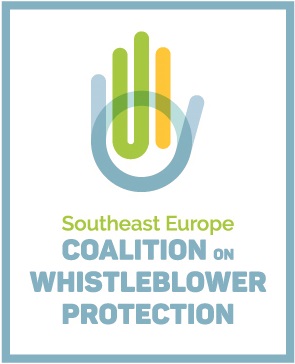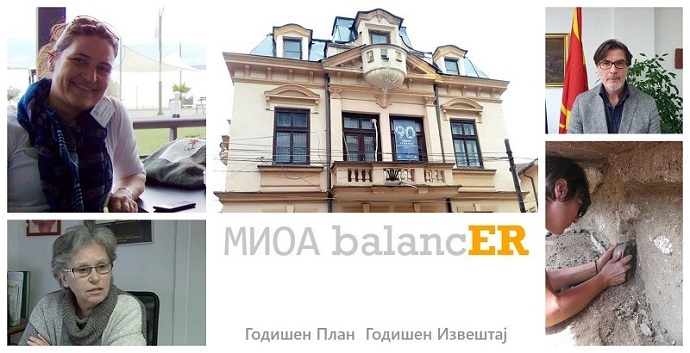


Author: Vesna Ivanovska-Ilievska
For over 20 years, she has been exploring the archeological sites in the country, and yet she does not have a single day of work recorded in her years of service. In cold weather, under the hot sun, at underwater sites, archaeologist Valentina Todoroska has been a regular member of archeological teams in Macedonia and the region. She has collaborated with almost every museum in the country, and her last long-term contract engagement was with Dr. Nikola Nezlobinski Museum in her native Struga. At the end of 2019, the museum announced an open job position.
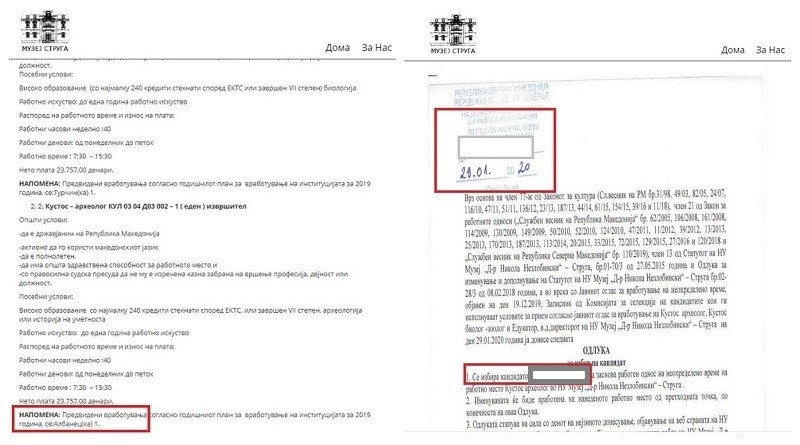
After four years of work as a freelancer, Todoroska applied for the post in the hope that her employment status would finally be resolved. Although the job advertisement stated that the position was exclusively intended for an archaeologist of Albanian nationality, she applied expecting that a given procedure would be followed – namely, if a candidate of the desired nationality does not apply in two consecutive announcements, then the third announcement takes into account all registered candidates. However, a candidate was selected in the first round – the commission gave an explanation that the chosen candidate was more appropriate; even though the candidate was Macedonian, she stated in her job application that she was Albanian. The acting director of the museum claims that the procedure has not been violated since national identity is a personal choice.
CORRESPONDING CASES A YEAR AGO
A lawsuit is currently pending in this case, as well as for another employment from the same job announcement. For the position of biologist intended for a candidate of Turkish nationality, a candidate with a Macedonian name and surname was employed. In December 2019, media reported about a similar situation in the Territorial Fire Brigade of the City of Skopje when Macedonians declared themselves to be of Albanian nationality in order to get hired more easily.
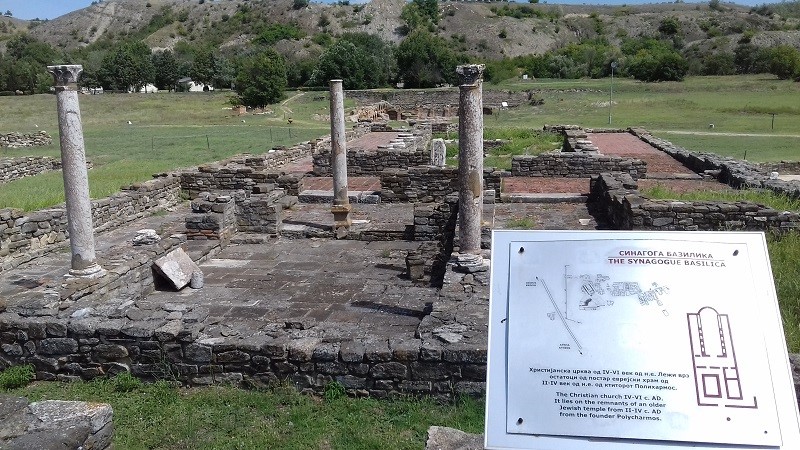
An experienced archaeologist from Skopje has been trying to get a job according to his qualifications for years. Despite working for more than 20 years, he only has a record of 6 years of service (which he has acquired in other professions), and has spent 13 years as a contract employee that cannot be recorded in his years of service. He insists on remaining anonymous because he applied for a vacancy during the writing of this article. This is his ninth attempt. He is Serbian on his father’s side and Macedonian on his mother’s side of the family. From 2007 to 2019, he actively participated in many archaeological excavations in the country. For almost as many years, he has been applying for job vacancies in four institutions in the field of museology and protection of cultural heritage in Skopje. He tried eight times and was rejected in each case. The last time he applied, he stated that he is Serbian because one of the job vacancies was intended for that nationality.
– I did not get the job. I guess there was another “bigger Serb” than me. I am not angry with my colleagues; the system is simply wrong. If you get a chance and have “connections”, it is only natural that you will use them to solve an issue of vital importance. The problem is that by signing a statement that you feel as a Serb, Albanian, Roma, Turk … you get the advantage – he says.
These cases raise the question about the way professionals are employed in museums and institutes for protection of cultural monuments in the country. Experts say the system is flawed, with room for manipulation. These institutions are short of staff, but there are very few employment opportunities. Supposing that these positions are filled with unsuitable candidates, the institutions could experience long-term difficulties in performing their tasks. Whether the candidates are archaeologists, architects, art historians, ethnologists or experts in the field of history or natural sciences, it takes years to build a museum professional and the experience passed on by senior staff is invaluable.
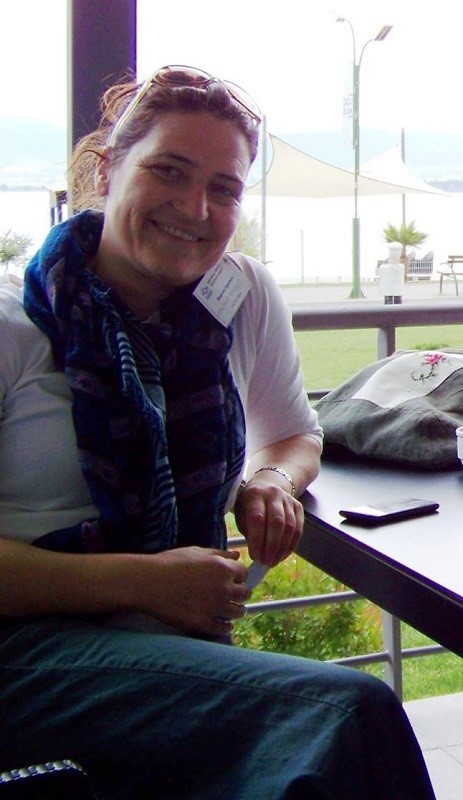
Todoroska graduated in 2005 at the Department of History of Art and Archeology at the Faculty of Philosophy at the Ss. Cyril and Methodius University in Skopje. She has recently presented her master’s thesis “Palafitte settlements in the region of Ohrid and Struga” under the mentorship of Prof. Dr. Dragi Mitrevski. She participated in archeological excavations for the first time at the site of Vardarski Rid near Gevgelija when she was still a student, in 1996, and to this day, she has been working as an archaeologist.
THE ONLY ARCHAEOLOGIST IN MACEDONIA WITH ESD CERTIFICATE
The circumstances after her graduation paved the way for her speciality – underwater archaeology, and she conducted her postgraduate studies in that direction. In order to upgrade her knowledge, she attended several international training courses for underwater archeology in the past decade, and in 2017, she received the ESD (European Scientific Diver) certificate, which makes her the only archaeologist in the country with that type of degree.
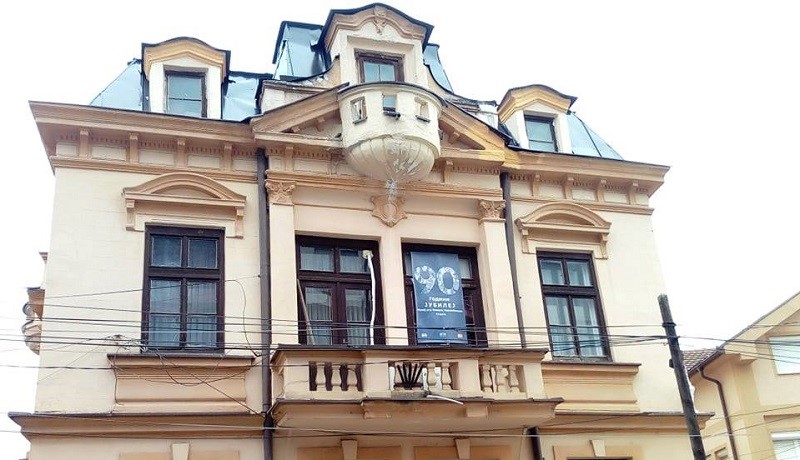
Her professional engagement with Dr. Nikola Nezlobinski Museum officially began in 2001 and 2003 during underwater research at the site of Vrbnik. From September 2015 until the end of 2019, she had a contract with the museum to work as a curator, educator and record keeper both in the field of art and logistics during organization of exhibitions. There is a certificate issued by the museum regarding her contract. Todoroska explains that in August 2019 the Museum received funds to announce vacancies for the positions of archaeologist, biologist, educator, lawyer and accountant. The announcement was made four months later, on December 19.

– I duly submitted the complete documentation. I did not have high hopes because it was emphasized that the position is intended for a candidate of Albanian nationality. I followed my belief that competences and long years of experience should have priority over ethnicity. It was suggested to me to state that I feel as an Albanian in order to increase my chances, but my moral compass told me otherwise – explains Todoroska.
During the review of the submitted documentation, the commission requested an additional report from the Pension and Disability Insurance Fund (PDIF) for accomplished years of service – a document that Todoroska could not submit, because, despite her long professional engagement, she did not have a single record of employment in her years of service.
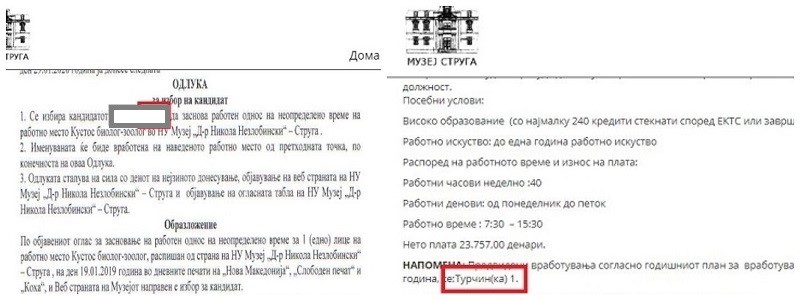
– Initially, I was not even invited for an interview. After I asked for an explanation, I was told that there had been a misunderstanding and that they would call me later. The interview took place on January 24, and on January 29, the museum’s website published the results that another candidate had been selected – says Todoroska.
After consulting with lawyers and receiving support from several of her colleagues, she decided to file a lawsuit. The trial is pending. Todoroska says that the decision to press charges was largely influenced by the explanation of the commission that according to the submitted documentation and the results of the interview the other candidate was found to be more competent.
ACTING DIRECTOR CLAIMS “THE MATTER IS CLEAR”
Jovan Vasileski, the acting director of Dr. Nikola Nezlobinski Museum, claims that there was no violation of the procedure in the job announcement.
– We employed experts. The announcement stated that the candidate would be selected according to their ethnic affiliation, as required by the law in order to ensure equitable representation. The commission took into consideration all the applications that were submitted – says Vasileski.
The commission consisted of three external associates – heads of institutions. Vasileski explains that the directors of Struga Poetry Evenings, Grigor Prlichev Library in Ohrid and Braka Miladinovci Cultural Centre in Struga were engaged.
– The selection process was regular. It is a personal choice to declare affiliation to a certain ethnicity, but the most important thing is the expertise. The first candidate was a demonstrator at the Faculty of Natural Sciences and Mathematics; the second candidate had field experience at the sites. I am not saying that the other candidates were not experts. There are pending lawsuits, and how they will end depends on the court that has the final word. I would not comment on anything else before there is a court verdict – says Vasileski.
Although museum institutions in the country are completely under the authority of the Ministry of Culture or the authority of municipalities (if they are local), the job announcements are conducted through the Ministry of Information Society and Administration (MISA). The Ministry of Culture refers everyone there, with the explanation that the Law on Public Sector Employees and the Law on Administrative Servants regulate these issues. They quote Article 77-j of the Law on Culture, according to which the form and content of the public announcement and the application for employment, the manner of conducting the audition and the manner of scoring are determined by a general act of the public institution adopted by the Board of Directors, at the proposal of the Director.
– The dissatisfied candidate has the right to appeal to the Board of Directors against the decision of the Director. The Ministry of Culture has no authority over operating procedures of institutions, nor over the manner and procedures for preparing acts in the field of labor relations – say from the Ministry of Culture.
WHAT DOES THE LAW SAY?
Тhe Ministry of Information Society and Administration says that the amendments to the Law on Public Sector Employees and the Law on Administrative Servants are in progress. They are intended to further regulate the procedure for planning employment in the public sector taking into account the constitutional principle of expression of national identity and the principle of adequate and equitable representation of members of communities.
– According to Article 8, line 2 of the Constitution of the Republic of North Macedonia, the free expression of national identity is a fundamental value – say from MISA.
The Law on Administrative Servants is clear
The legislator determines the whole procedure for employment in a very clear way, say from MISA. The Agency for Administration is in charge of enforcing the employment of administrative servants. According to Article 44 paragraph (2), when there is an insufficient number of candidates on the ranking lists that belong to a community for which the new employments are provided, the announcement is repeated only for the positions and the number of employees needed.
According to paragraph (3), even if there is not a sufficient number of candidates that belong to the targeted community for the second job announcement, the Commission prepares a single ranking list that ranks the candidates from all previously published announcements. Then the commission selects the best-ranked candidates from that list, regardless of their community affiliation and within three days sends the proposals to the institution – say from MISA.
They explain that the Law on Public Sector Employees adopted in 2015, provides a first-time mechanism for adequate and equitable representation of community members within each institution in the public sector. The plans are made based on the needs of the institutions and publicised as annual employment plans, and are prepared by the heads of the institutions based on the methodology stated in Article 5 paragraph (3) of the Law. The employment plan is prepared by each institution and contains data about job positions and vacancies in the institution, about upcoming retirements and other movements of employees, and a plan for distribution of the number of new employees in the next year by community affiliation.
– If it is assessed that the plan has been prepared according to the given methodology, the Ministry gives its consent – say from MISA.
Article 14 of the Law regulates the classification of jobs in the public sector according to which civil servants are employed. It is divided into four groups: administrative officers who perform tasks of an administrative nature; officials with special authority in the field of security, defence and intelligence; officials performing activities of public interest which are not of administrative nature; positions that include support and technical staff (maintenance, security, etc.).
Is it possible to annul the employment of an administrative servant?
An employment contract is annulled if violations of the procedure are found, and this matter is addressed in the Law on Administrative Servants, Article 19-a. The Director of the Agency establishes a Commission for Audit of the Selection of Administrative Servants. Provided that any shortcomings are identified, the Commission is required to submit a report on the shortcomings to the Director of the Agency, the State Administrative Inspectorate and the institution that is the employer.
The shortcomings in the procedure for selection of the candidate are grounds for annulment of the announcement for employment of an administrative servant. The decision for annulment of the announcement is made by the head of the institution that is the employer on their own accord or by order of the State Administrative Inspectorate – say from MISA.
“WE DO NOT NEED POLITICAL, BUT PROFESSIONAL STAFF”
A year ago, an unstamped document circulated in social media, indicating a similar case in the Cultural Heritage Protection Office (CHPO). Director Aco Kostov says that it was an office prank. However, he is convinced that there is a huge problem with the way of employment in these specialized institutions. Kostov is an architect and conservation consultant who worked at the NI Conservation Centre for many years before taking over the management position at CHPO. He believes that experienced staff members should transfer the acquired knowledge and begin training their successors at least ten years before their retirement.
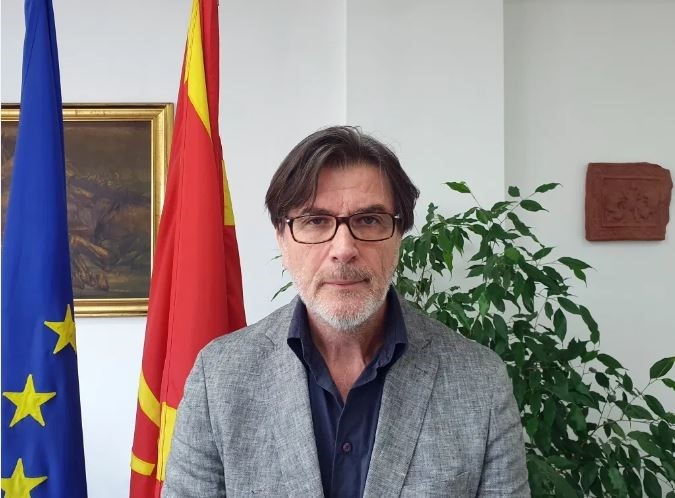
– It is not just about talent. You also need to be adventurous, willing to sacrifice a large portion of your life. You need to be able to spend days, sometimes months in the field, in the mountains or the countryside. Not many people can cope with that. You need to have all those qualities in one person. In addition, the candidates must possess a desire to learn, to respect older colleagues and absorb all their knowledge. We are talking about cultural heritage. You cannot get the experience from a textbook, you have to acquire it – says Kostov.
Therefore, he adds, this way of employing professionals in this area is unacceptable. The fact that there are few opportunities for permanent employment is further complicated by the principle of equitable representation. Expertise, not nationality, must be the criterion for employment, and the representation of nationalities in the institutions can be dealt with in another way.
– So, you have people in the field who know their job very well, but others get the jobs. Where is the professionalism here? There are employees who refuse to do fieldwork. You simply cannot force them, nor can you fire them. Respect is earned in the field and then you slowly advance in the hierarchy. And we have come to a point where people with a five-year experience evaluate and approve projects to people who have been working for 30 years and know their job very well. Materials are piled up, work is delayed; the whole system is obstructed. This profession is essential. We do not need political, but professional staff – Kostov is decisive.
A DEMANDING PROFESSION
Dr. Aleksandra Papazovska is an archaeologist with the Archaeological Museum of North Macedonia and President of the Macedonian Archaeological Society (MAS). She says that unofficially everyone knows how employments are carried out, and the matter is openly discussed in professional and scientific circles.
– A person can find employment only if they pull some strings. Over the past 20 years, none of the colleagues I know got the job by simply applying for a vacancy. This does not mean that competent people were not hired, on the contrary; but they were also exposed to the fact that they ought to have “connections”. That speaks volumes about our system – says Papazovska.
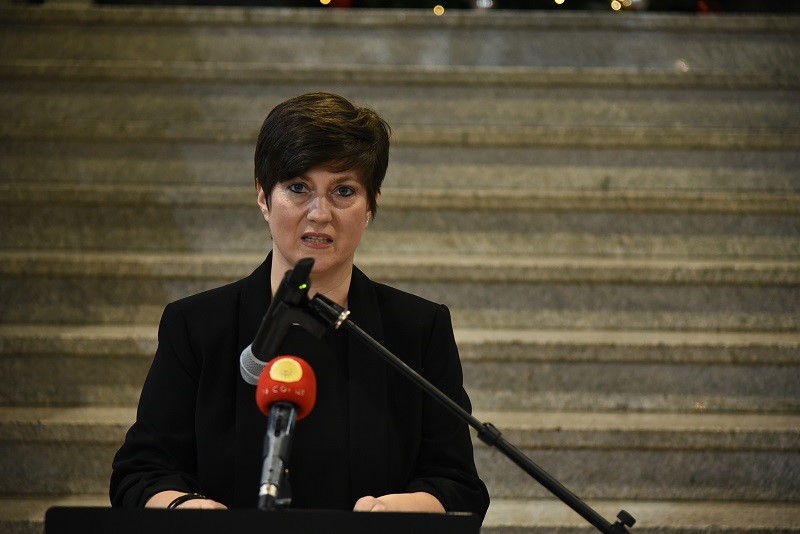
She explains that archeology is not a simple profession. Education is only the first step and it continues throughout one’s professional life. After graduating from the faculty, even during master studies, one does not become an archaeologist. They have to take part in numerous field researches, if they are lucky they get the chance to learn from the best, and after at least 10 years of active field and professional work they can start working independently. Unfortunately, real archaeologists do not always have the opportunity to be employed.
The process of training an archaeologist is more or less the same in all neighbouring countries, including Europe. However, there they have criteria in terms of the quality of the individual.
– Senior archaeologists choose their successors, and if they manage to get them, they are people with great potential. Prior to retirement, experienced archaeologists work for many years as mentors to their successors, who, in the meantime, work on their master’s and doctoral degrees in the relevant fields. Thus, the work process in the institutions does not suffer, because new archaeologists who inherit the work are being created during that period – explains Papazovska.
In our country, when a professional retires the position gets closed. Papazovska says that it is a systemic flaw to treat museum staff as administration. The result of this illogical treatment are museum collections that no one inherits, consequently endangering our cultural heritage. If a person
is lucky enough to enter such a position, they must start learning from the ground up and go through all the challenges.
– And instead of moving forward, we have been at a standstill for decades because no one passes on their knowledge. Professionals who have been amassing information for decades are retiring with their knowledge. That is really sad. The policy and dynamics of employment of professionals must be made by the institutions themselves, in cooperation with the educational institutions in order to avoid oversupply of cadres. It is a complex process, which cannot be solved with political solutions and manipulations as it has been until now – says Papazovska.
SUPPORT FROM THE MUSEUM SECTOR
Maja Cankulovska-Mihajlovska is a senior curator at the National Gallery of the Republic of North Macedonia and President of the Macedonian National Committee of the International Council of Museums (MNC ICOM). She says that the Association has no legal authority over the employment of staff in state institutions, but their work is based on the principles defined in the ICOM Code of Ethics for Museums from 1986.
– Due to the absence of rulebooks in the institutions regarding minimum professional requirements that a candidate has to meet, as opposed to any other criteria (nationality, political party etc.), we will be facing poor performance in the museum profession in the long run. In our country, the professionalism of the candidate is often not a priority when it comes to employment. It is contrary to the declarative efforts of those in charge of conducting a quality performance and prosperity in this area – says Cankulovska-Mihajlovska.
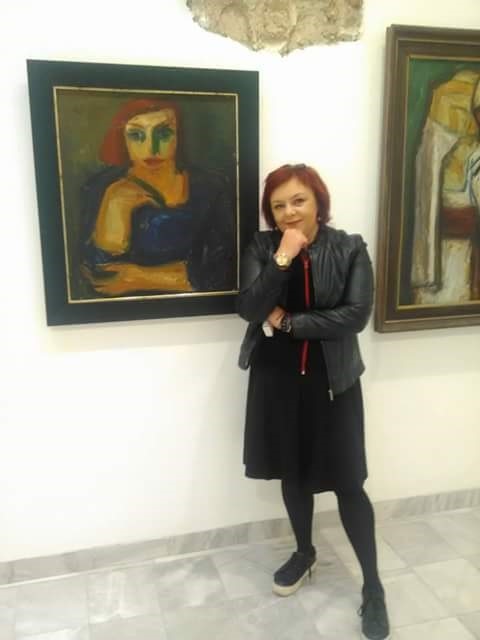
According to her, the failure to select the most appropriate candidate for a job vacancy is devastating for many other aspects of cultural heritage protection. In the case of Todoroska, MNC ICOM promptly reacted to the Ministry of Culture, citing her professional biography in their complaint, her previous extensive engagement as a curator-archaeologist in Dr. Nikola Nezlobinski Museum, and all her continuous engagements supported and financed by the Ministry of Culture.
– Todoroska is the only professional in the Republic of North Macedonia who has specialised in the field of underwater archeology with an ESD certificate. The Commission for selection of candidates and the acting director should have taken into account this evidence of professionalism in their (non)selection of the candidate – Chankulovska-Mihajlovska is categorical.
In March 2020, MNC ICOM received a response from the Ministry of Culture that the complaint had been forwarded to the State Administrative Inspectorate, but they declared themselves incompetent in this matter and forwarded the case to the State Labor Inspectorate.
– A final answer has not been received yet. We will probably face another process that is stuck in the bureaucratic labyrinth, which means that no one wants to “bother” with the professional and ethical principles in this area – says Cankulovska-Mihajlovska.
CAN YOU PROVE NATIONALITY IDENTITY?
Prof. Dr. Mirjana Najcevska is a lawyer, full-time professor at the Institute for Sociological, Political and Juridical Research, activist and a human rights advocate. She says that according to the Framework Convention for the Protection of National Minorities, everyone has the right to renounce the ethnic community they belong to and join another one without any negative consequences.
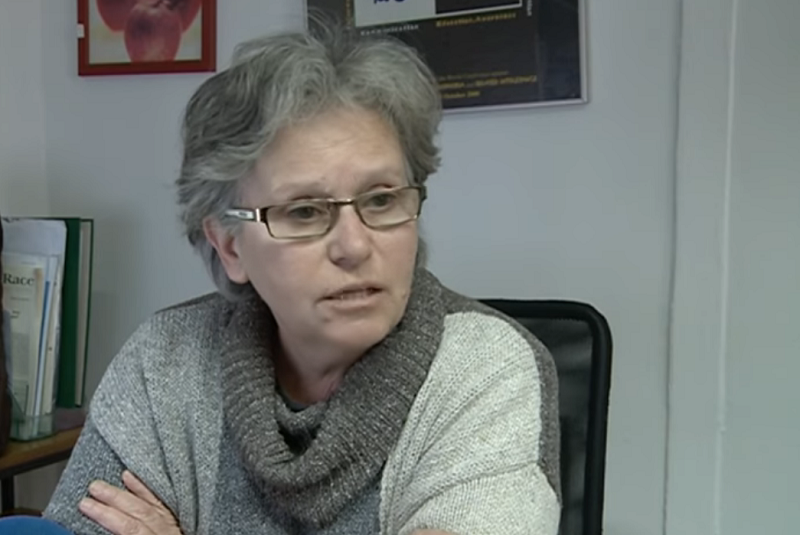
– Since ethnicity in our country is primarily determined by the language spoken by a certain group (even the law determines the percentage of an ethnic community by the language they use to communicate), I think that this type of job announcements should include the knowledge of the specific language as a requirement. This skill is measurable and a scoring test can be done. If knowledge of a specific culture is required, then an experience is needed which shows that the candidate has worked in a place where they had the opportunity to get acquainted with the specified culture and have the necessary skills related to it – says Najcevska.
She says that in all these cases she can see manipulation of the law and making the constitutional and legal provisions that are aimed at the preservation and development of different cultures and languages meaningless.
– There are grounds for annulment, and that is the fact that ethnic affiliation is indeterminable. Our country has ratified the Framework Convention for the Protection of National Minorities and thus accepted the possibility of changing ethnicity. The Constitution and the laws mention the linguistic parameter as conclusive when it comes to the application of the provisions on equitable representation (for example, Article 7 of the Constitution). At the very least, ethnic identity should be proven for positions where it is of importance (because of both the language and the need to protect and promote different cultural heritage). Anything other than that is circumvention of the Constitution and the laws – Najcevska is decisive.
One year after the announcement for employment in the museum in Struga, Todorska says that she perceives this whole period as a parody. Having a four-year engagement as a freelancer meant that she was involved in several long-term museum projects for international cooperation. In the same week when she received the decision that she was not selected for the position, she was supposed to represent Dr. Nikola Nezlobinski Museum at a symposium in Rome. A month later, she received an invitation to study at Charles University in the Czech Republic, and started negotiations with the University of Bern for underwater research at the Vrbnik site.
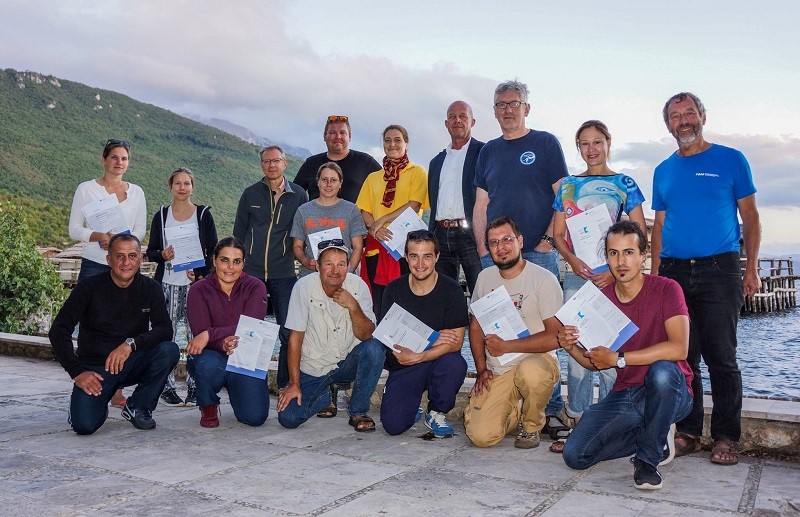
– It would be hypocritical to say that I am indifferent. However, I consciously chose archaeology as my profession. It is my passion, I feel I have so much more to give and benefit from it. Even now, with a feeling of rejection and alienation, I still choose to belong to archaeology. I choose to not give up. I choose to go out on the field with my colleagues at dawn every day. Because I belong there. I do the job that I am educated to do, the job in which I have invested time and money, and the job that I do well. I still have hope that it is only a matter of time before this whole situation is resolved, everything falls into place, and true values get the recognition and support they deserve – concludes Todoroska.
This investigative story was produced with the financial support of the European Union. Its contents are the sole responsibility of the author and do not necessarily reflect the views of the European Union.



